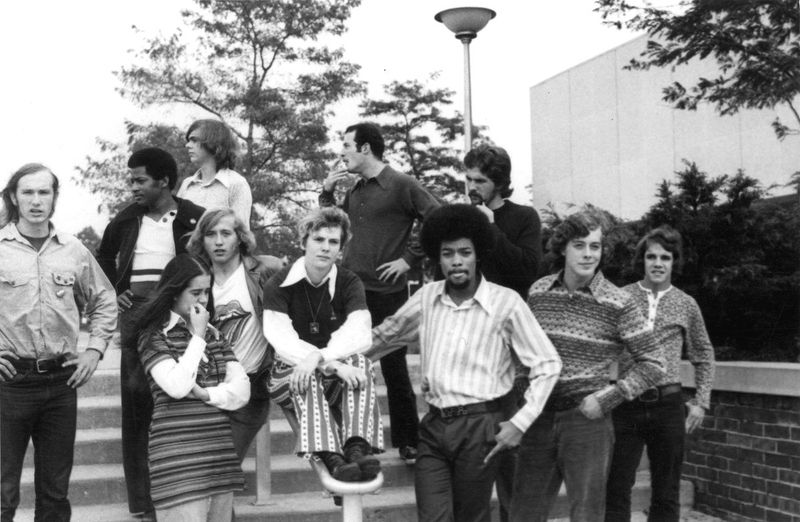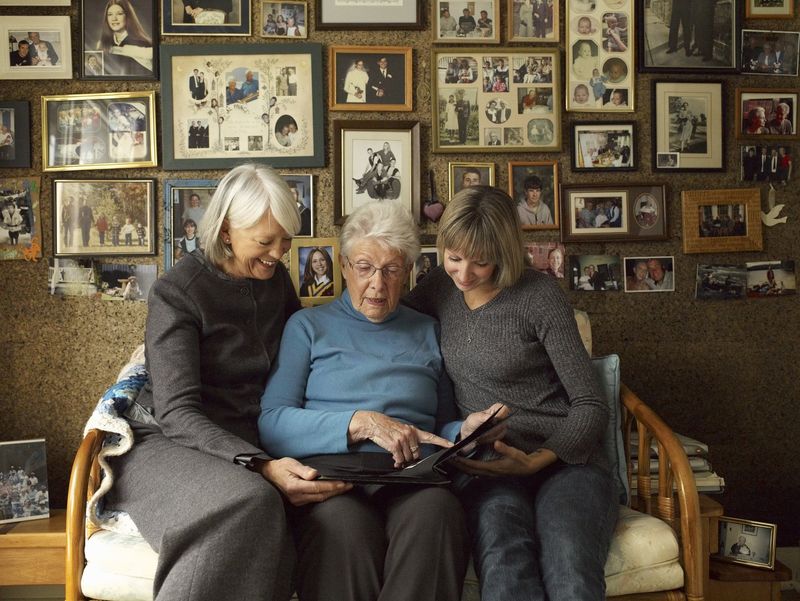Boomers have long been known for their distinct cultural trends, but some of these trends have not aged well. It’s time to address and challenge these outdated behaviors and mentalities that continue to exist within society.
From stubborn social norms to prejudiced opinions, these trends can be harmful and offensive. This blog post explores 24 such boomer trends that need reevaluation in today’s world.
Let’s take a closer look at these pervasive issues and consider how we can foster a more inclusive and progressive environment. We owe it to ourselves and future generations to speak up and make a change.
1. Dismissal of Mental Health
The dismissal of mental health concerns is a troubling trend. Many boomers grew up in an era where mental health was stigmatized. The phrase “it’s all in your head” was commonly thrown around, trivializing real struggles.
This mindset can discourage younger generations from seeking help. Recognizing mental health as a legitimate issue is crucial. It affects individuals’ well-being and productivity. Encouraging open dialogues helps dismantle the stigma.
We must acknowledge mental health’s importance to create supportive environments. By understanding and compassionately addressing these concerns, we can foster a healthier society for all.
2. Gender Stereotyping
Gender stereotyping is a trend that persists among boomers. Traditional roles often dictated men’s and women’s behaviors, leaving little room for individual expression. This outlook can be limiting and harmful.
Breaking free from these stereotypes allows individuals to explore diverse interests and careers. It promotes equality and understanding between genders. Challenging these outdated norms encourages a more inclusive society.
Recognizing the value of diverse perspectives is essential. By fostering an environment where everyone can thrive, we dismantle barriers and encourage personal growth. Let’s embrace change and redefine gender roles for future generations.
3. Racial Insensitivity
Racial insensitivity continues to be an issue within the boomer generation. Many grew up in a time when racial jokes and stereotypes were normalized, perpetuating harmful biases. This insensitivity can alienate and harm individuals from different backgrounds.
Education and empathy are key to overcoming racial insensitivity. We must listen to marginalized voices and acknowledge their experiences. By fostering understanding, we can build bridges and promote harmony.
Embracing diversity enriches our lives and communities. Challenging these insensitivities helps create a more equitable society. It’s time to move past outdated beliefs and embrace acceptance and inclusivity.
4. Resistance to Technology
Resistance to technology is a common trend among boomers. Growing up in an analog world, they often view digital advancements with skepticism. This reluctance to embrace technology can hinder communication and progress.
Understanding and utilizing technology opens doors to endless possibilities. It enhances connectivity and accessibility, improving daily lives. Encouraging boomers to engage with technology can bridge generational gaps.
Providing guidance and support in learning new tools can ease this transition. Embracing technology empowers individuals to stay connected and informed. Let’s encourage curiosity and adaptability as we navigate an increasingly digital world.
5. Environmental Neglect
Environmental neglect is a pressing issue linked to boomer trends. Many grew up with less awareness of ecological impact, leading to unsustainable practices. This disregard for environmental health affects future generations.
Raising awareness about sustainability is crucial for addressing this trend. Simple actions, like reducing waste and conserving resources, make a significant difference. We must prioritize the planet’s well-being.
By educating and inspiring change, we can create a greener future. Encouraging eco-friendly habits benefits everyone. Let’s take responsibility for the environment and strive for a sustainable, thriving world for all.
6. Ageist Attitudes
Ageist attitudes can create unnecessary divides. Boomers often view younger generations as inexperienced or lazy, leading to stereotypes that hinder collaboration. This mindset can stifle innovation and mutual respect.
Valuing contributions regardless of age fosters a more inclusive environment. Recognizing that wisdom and fresh perspectives coexist enhances creativity and problem-solving. Encouraging intergenerational collaboration benefits everyone.
By challenging ageist attitudes, we can build bridges and strengthen relationships across generations. Let’s celebrate diverse talents and perspectives to create a harmonious, dynamic society that respects all ages.
7. Workaholism
Workaholism is a trend deeply ingrained in boomer culture. Many were taught that hard work defines success, often at the expense of personal time and health. This mentality can lead to burnout and strained relationships.
Finding a balance between work and personal life is essential for well-being. Prioritizing self-care improves productivity and happiness. Encouraging flexible work environments supports this balance. Rediscovering passions outside of work enriches life experiences.
By challenging workaholism, we promote healthier lifestyles and stronger connections. Let’s redefine success to include happiness and fulfillment beyond professional achievements.
8. Rigid Educational Paths
Boomers often emphasize rigid educational paths, viewing college as the only route to success. This mindset can limit opportunities and stifle creativity. It’s crucial to recognize diverse learning paths.
Embracing alternative education fosters innovation and adaptability. Vocational training and online courses offer valuable skills and knowledge. Encouraging exploration in education broadens horizons.
Recognizing the uniqueness of each individual’s journey is vital. By challenging traditional educational norms, we empower future generations to pursue passions.
Let’s encourage lifelong learning and growth, celebrating diverse achievements and redefining success in education.
9. Disdain for New Music
Disdain for new music is a trend among boomers, often dismissing contemporary genres as inferior. This attitude can limit appreciation for diverse musical expressions.
Exploring new music broadens cultural understanding and appreciation.
It fosters connections across generations and encourages open-mindedness. Music evolves, reflecting societal changes and emotions. Embracing musical diversity enriches our lives.
By listening with an open mind, we can discover new favorites and enjoy shared experiences. Let’s celebrate creativity and diversity in music, fostering a deeper appreciation for the artistry and innovation of today’s musicians.
10. Stubborn Political Views
Stubborn political views among boomers can cause tension and division. Holding onto outdated perspectives may prevent productive discussions and compromise.
Engaging in open dialogues fosters understanding and bridges divides.
Respecting diverse opinions encourages collaboration and progress. Challenging rigid views helps create a more inclusive political landscape. Emphasizing empathy and active listening in political discussions promotes unity.
We can work towards shared goals by valuing different perspectives. Let’s strive for a future where political discourse is respectful and constructive, paving the way for positive change.
11. Reluctance to Change
Reluctance to change is a trait often associated with boomers. Growing up in a stable post-war environment, change can be perceived as a threat. This resistance can hinder growth and innovation. Embracing change encourages adaptability and resilience.
It opens opportunities for personal and societal development. Challenging this reluctance fosters progress and transformation. Supporting gradual transitions eases anxiety and builds confidence.
By welcoming change, we empower individuals to thrive in evolving circumstances. Let’s embrace the possibilities change brings and cultivate a culture of growth and adaptability.
12. Patriarchal Family Structures
Patriarchal family structures remain prevalent among boomers, often placing men in dominant roles. This dynamic can limit women’s voices and perpetuate gender inequality.
Challenging patriarchal norms promotes equality and mutual respect in families. Encouraging shared responsibilities fosters supportive environments. Recognizing the value of diverse family dynamics enriches relationships.
Empowering women to lead and contribute equally strengthens families. By dismantling patriarchal structures, we create inclusive and harmonious households.
Let’s advocate for equality and collaboration, ensuring all family members have a voice and role in decision-making.
13. Consumerism
Consumerism is a trend deeply rooted in boomer culture. The pursuit of material goods is often equated with success and happiness. This mindset can lead to unsustainable habits and environmental strain.
Recognizing the impact of consumerism encourages mindful consumption. Prioritizing experiences over possessions fosters lasting fulfillment. Embracing sustainable practices benefits the planet and future generations.
By redefining success beyond material wealth, we cultivate a culture of balance and contentment. Let’s promote conscious consumerism, cherishing experiences and relationships over fleeting material gains.
14. Paper-Based Habits
Paper-based habits persist among boomers, often resisting digital alternatives. This reliance on paper can lead to inefficiencies and environmental concerns.
Embracing digital tools enhances productivity and reduces waste.
Encouraging the adoption of technology streamlines processes and improves organization. Supporting individuals in transitioning to digital habits fosters adaptability.
By reducing paper usage, we contribute to environmental sustainability. Let’s encourage the integration of digital tools, simplifying tasks and promoting efficiency.
15. Judgment of Appearance
Judgment of appearance is a trend seen among boomers, often critiquing non-traditional styles and choices. This mindset can stifle self-expression and creativity.
Embracing diverse appearances encourages individuality and acceptance.
Recognizing beauty in all forms fosters confidence and inclusivity. Challenging judgmental views promotes a more open-minded society. Encouraging acceptance of diverse styles enriches cultural expression.
By celebrating individuality, we create a more vibrant and accepting world. Let’s support personal expression and redefine beauty standards for future generations.
16. Dependency on Outdated Media
Dependency on outdated media is common among boomers, often preferring print newspapers and VHS tapes. This reliance can limit access to diverse information and perspectives. Embracing modern media broadens horizons and enhances connectivity.
Digital platforms offer instant access to global news and entertainment. Encouraging the exploration of new media enriches experiences and fosters understanding. By adapting to digital advancements, we stay informed and engaged.
Let’s embrace the benefits of modern media, expanding our knowledge and creativity.
17. Resistance to Alternative Lifestyles
Resistance to alternative lifestyles is a trend among boomers, often rooted in traditional beliefs. This resistance can marginalize and alienate individuals who live differently.
Promoting acceptance of diverse lifestyles fosters inclusivity and understanding.
Recognizing the validity of different paths enriches societal fabric.
Encouraging open-mindedness and empathy helps bridge divides. By challenging resistance, we create a more harmonious and supportive community.
Let’s celebrate diverse lifestyles and advocate for equality and acceptance for all.
18. Skepticism Towards Climate Change
Skepticism towards climate change is prevalent among some boomers, often dismissing scientific evidence. This denial can hinder efforts to address environmental issues.
Promoting climate education and awareness is crucial for fostering understanding.
Recognizing the impact of human actions encourages sustainable practices.
By embracing scientific findings, we can work towards solutions for climate challenges.
Let’s advocate for environmental responsibility and promote a sustainable future, acknowledging the need for change and action.
19. Nostalgia for the “Good Old Days”
Nostalgia for the “good old days” is a sentiment shared by many boomers. While reflecting on positive memories is natural, this nostalgia can overlook past injustices and challenges. Embracing present opportunities encourages growth and innovation.
Recognizing the progress made over time fosters appreciation and forward-thinking.
By valuing the present and future, we honor past achievements while striving for continued improvement.
Let’s celebrate progress and embrace current opportunities, building a brighter future for all generations.
20. Emphasis on Face-to-Face Interaction
An emphasis on face-to-face interaction is a trend among boomers, often viewing it as more genuine than digital communication. This preference can limit flexibility and accessibility.
Recognizing the value of virtual communication enhances connectivity and efficiency. Digital tools offer convenience and inclusivity, accommodating diverse needs.
Embracing both forms of interaction fosters adaptability.
By valuing diverse communication methods, we enhance collaboration and understanding. Let’s appreciate the benefits of virtual communication while cherishing in-person connections.
21. Aversion to Therapy
Aversion to therapy is common among boomers, often viewing it as unnecessary or stigmatized. This attitude can prevent individuals from seeking necessary support and guidance.Recognizing therapy’s importance promotes mental health and well-being.
Encouraging open discussions about emotions reduces stigma and fosters acceptance.
By valuing therapy as a tool for growth, we empower individuals to seek help and heal.
Let’s promote mental health awareness and support, encouraging everyone to prioritize their emotional well-being.
22. Preference for Traditional Workspaces
Preference for traditional workspaces is a trend among boomers, often valuing structured environments. This preference can limit flexibility and modern work practices.
Embracing remote work options enhances productivity and work-life balance.
Digital tools facilitate collaboration and adaptability, accommodating diverse needs.
Encouraging flexible work arrangements fosters innovation and inclusivity. By valuing diverse workspaces, we create a dynamic and progressive work culture.
Let’s appreciate the benefits of modern work environments while respecting traditional preferences.
23. Dependency on Landlines
Dependency on landlines is common among boomers, often preferring familiar communication tools. This reliance can limit access to modern connectivity and features.
Embracing mobile technology enhances accessibility and convenience. Smartphones offer diverse communication options and information access.
Encouraging the exploration of modern communication tools enriches experiences and fosters adaptability. By adapting to technological advancements, we stay connected and informed.
Let’s embrace the benefits of mobile technology, enhancing our communication and connectivity.
24. Rigid Gender Roles in Parenting
Rigid gender roles in parenting is a trend seen among boomers, often adhering to traditional family dynamics. This mindset can limit parental involvement and children’s development.
Challenging these roles promotes equality and balanced family responsibilities. Encouraging shared parenting enriches family relationships and supports children’s growth.
Recognizing diverse parenting styles fosters understanding and respect. By challenging rigid roles, we create inclusive and supportive families. Let’s advocate for equality in parenting, ensuring both parents have the opportunity to contribute to their children’s lives.
























